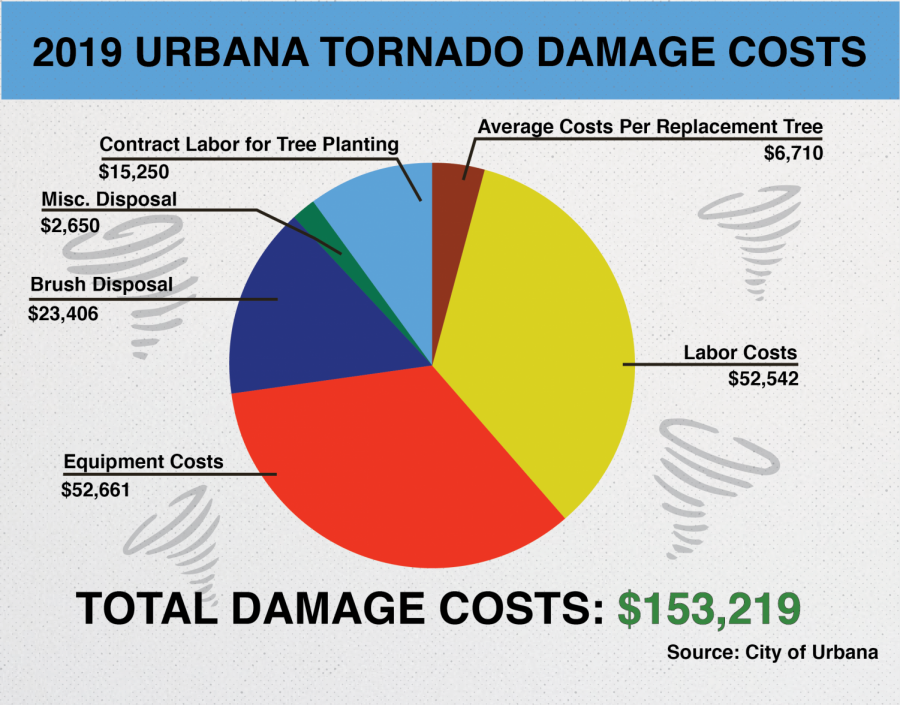Urbana continues efforts to rebuild area after tornado early this year
Oct 14, 2019
Earlier this year, Champaign-Urbana was hit with a devastating tornado that affected 755 residents and damaged 153 trees in the area. For the past few months, the area has been trying to clean up and rebuild the area in attempts to return it to its former glory.
The Urbana Public Works Department is still working to amend the issue.
“The next day (after the tornado) was hazard evasion, we started off trying to take care of the dangerous debris and clearing the streets for emergency response, then once those immediate hazards and roadways were cleared, we moved towards opening up access towards driveways and lesser areas,” said Vince Gustafson, Public Works Deputy Director of Operations.
The majority of the damage occurred due to the tree remains scattered throughout the city. As a result, the Public Works Department asked the Urbana Park District and the University for assistance in clearing the area. The Park District provided three dump trucks with operations to help load and relocate storm debris from the residential neighborhoods to the landscape recycling center. The University also supplied some dump trucks for transportation.
To help the residents, there was a prolonged period in which homeowners could move their debris onto the curb and have the city dispose of the remains. The city facilitated the pick-up, which is not a common practice for the Public Works Department, but because this was a unique situation, they decided to step in and aid the community.
Get The Daily Illini in your inbox!
Currently, the city’s main focus is to reestablish the wildlife and forestation in the community.
“We’re kind of in restoration mode now, so we got stumps that need to be ground out, and then we evaluate each planting site to make sure that we get the right species in the right tree,” Gustafson said. “There are some sites where there’s conflict because of power lines or street lines or other situational reasons where we may opt not to plant in, but (with) the majority of the sites, it’s our goal with the funding and resources available to replant wherever we can.”
The City of Urbana has been able to replace 10 to 15 trees that were in need of immediate care and are currently working on the long-term process of tree replacements. There were also several issues regarding sidewalk damage that were addressed accordingly.
“We are working with rotary on grant applications to plant some additional trees to replace the trees that were lost, but we don’t have any word on whether that plan will be awarded or not at the moment,” said Derik Liebert, Urbana Park District Representative. “Independent from the grant, I expect that we will be replanting trees, just probably not as quickly as the grant, but we still remain committed to maintaining the Urbana forests and our parks.”
According to a press release from the City of Urbana, the total estimated cost of cleanup was $131,259, and the estimated replacement cost was $21,960. Therefore, the Urbana Public District is encouraging people to donate to the Community Foundation of East Central Illinois, which will help keep track of the funds to be distributed to the replanting effort.
“There’s a lot of interest in the community in what we call tribute trees, which are trees people plant in recognition or memorial for an individual they want to recognize,” Liebert said. “We have a lot of trees in our parks that are tribute trees that were privately funded through donations.”
Aside from the recovery of the city, Tara Powell, assistant professor in Social Work, said dealing with the well-being and mental health of individual homeowners after a disaster such as this is vital.
Possible effects of these types of disasters include acute stress, which can cause people to lose sleep, have a shortened temper and be sensitive towards their surroundings. This typically lasts for around a month, according to Powell.
“Disasters are really complex, and there’s not a one-size-fits-all approach to helping somebody, but there are steps you can take,” Powell said. “There’s also not a formula for how a person’s going to react, so everybody’s unique, and we react in different ways.”






